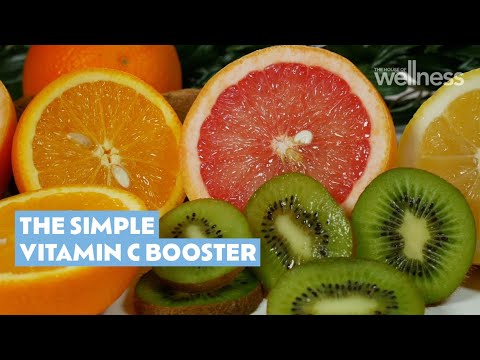What is vitamin B12 and what does it do?
Vitamin B12 is a nutrient that helps keep the body’s nerve and blood cells healthy and helps make DNA, the genetic material in all cells. Vitamin B12 also helps prevent a type of anemia called megaloblastic anemia that makes people tired and weak.
Two steps are required for the body to absorb vitamin B12 from food. First, hydrochloric acid in the stomach separates vitamin B12 from the protein to which vitamin B12 is attached in food. After this, vitamin B12 combines with a protein made by the stomach called intrinsic factor and is absorbed by the body. Some people have pernicious anemia, a condition in which they cannot make intrinsic factor. As a result, they have trouble absorbing vitamin B12 from all foods and dietary supplements.
How much vitamin B12 do I need?
The amount of vitamin B12 you need each day depends on your age. Average daily recommended amounts for different ages are listed below in micrograms (mcg):
Life Stage Recommended Amount
Birth to 6 months 0.4 mcg
Infants 7–12 months 0.5 mcg
Children 1–3 years 0.9 mcg
Children 4–8 years 1.2 mcg
Children 9–13 years 1.8 mcg
Teens 14–18 years 2.4 mcg
Adults 2.4 mcg
Pregnant teens and women 2.6 mcg
Breastfeeding teens and women 2.8 mcg
What foods provide vitamin B12?
Vitamin B12 is found naturally in a wide variety of animal foods and is added to some fortified foods. Plant foods have no vitamin B12 unless they are fortified. You can get recommended amounts of vitamin B12 by eating a variety of foods including the following:
Beef liver and clams, which are the best sources of vitamin B12.
Fish, meat, poultry, eggs, milk, and other dairy products, which also contain vitamin B12.
Some breakfast cereals, nutritional yeasts and other food products that are fortified with vitamin B12. To find out if vitamin B12 has been added to a food product, check the product labels.
What kinds of vitamin B12 dietary supplements are available?
Vitamin B12 is found in almost all multivitamins. Dietary supplements that contain only vitamin B12, or vitamin B12 with nutrients such as folic acid and other B vitamins, are also available. Check the Supplement Facts label to determine the amount of vitamin B12 provided.
Vitamin B12 is also available in sublingual forms (which are dissolved under the tongue). There is no evidence that sublingual forms are better absorbed than pills that are swallowed.
A prescription form of vitamin B12 can be administered as a shot. This is usually used to treat vitamin B12 deficiency. Vitamin B12 is also available as a prescription medication in a nasal gel form that is sprayed into the nose.What is vitamin B12 and what does it do?
Vitamin B12 is a nutrient that helps keep the body’s nerve and blood cells healthy and helps make DNA, the genetic material in all cells. Vitamin B12 also helps prevent a type of anemia called megaloblastic anemia that makes people tired and weak.
Two steps are required for the body to absorb vitamin B12 from food. First, hydrochloric acid in the stomach separates vitamin B12 from the protein to which vitamin B12 is attached in food. After this, vitamin B12 combines with a protein made by the stomach called intrinsic factor and is absorbed by the body. Some people have pernicious anemia, a condition in which they cannot make intrinsic factor. As a result, they have trouble absorbing vitamin B12 from all foods and dietary supplements.
How much vitamin B12 do I need?
The amount of vitamin B12 you need each day depends on your age. Average daily recommended amounts for different ages are listed below in micrograms (mcg):
Life Stage Recommended Amount
Birth to 6 months 0.4 mcg
Infants 7–12 months 0.5 mcg
Children 1–3 years 0.9 mcg
Children 4–8 years 1.2 mcg
Children 9–13 years 1.8 mcg
Teens 14–18 years 2.4 mcg
Adults 2.4 mcg
Pregnant teens and women 2.6 mcg
Breastfeeding teens and women 2.8 mcg
What foods provide vitamin B12?
Vitamin B12 is found naturally in a wide variety of animal foods and is added to some fortified foods. Plant foods have no vitamin B12 unless they are fortified. You can get recommended amounts of vitamin B12 by eating a variety of foods including the following:
Beef liver and clams, which are the best sources of vitamin B12.
Fish, meat, poultry, eggs, milk, and other dairy products, which also contain vitamin B12.
Some breakfast cereals, nutritional yeasts and other food products that are fortified with vitamin B12. To find out if vitamin B12 has been added to a food product, check the product labels.
What kinds of vitamin B12 dietary supplements are available?
Vitamin B12 is found in almost all multivitamins. Dietary supplements that contain only vitamin B12, or vitamin B12 with nutrients such as folic acid and other B vitamins, are also available. Check the Supplement Facts label to determine the amount of vitamin B12 provided.






